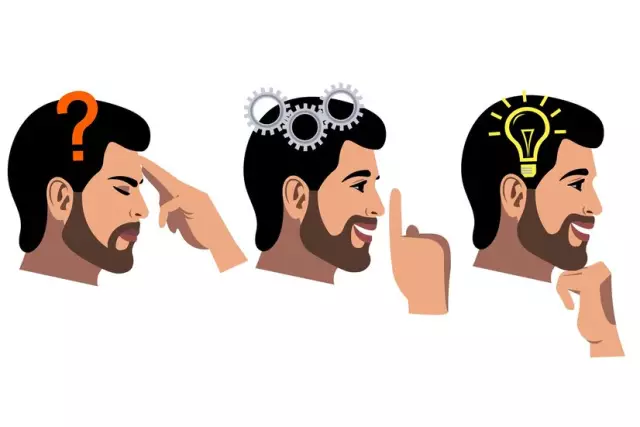- Author Rachel Wainwright [email protected].
- Public 2023-12-15 07:39.
- Last modified 2025-11-02 20:14.
Hypomania
The content of the article:
- Causes and risk factors
- Disease types
- Symptoms
- Features of the course of hypomania in children
- Diagnostics
- Treatment
- Possible complications and consequences
- Forecast
- Prevention
Hypomania is one of the affective disorders (mood disorders) characterized by a mild degree of mania and the absence of psychotic symptoms (hallucinations, delusions).
Most patients with hypomanic conditions do not seek medical help because they consider themselves healthy, so there is no exact data on the prevalence of the disorder.

Hypomania - an affective mood disorder
Causes and risk factors
Hypomania occurs under the influence of the following reasons:
- hormonal imbalance (menopause, postpartum syndrome, thyroid hyperfunction);
- long-term adherence to a low-calorie diet or anorexia;
- taking certain medications (opiates, teturam, yohimbine, Bromocriptine, Captopril, Baclofen, Levodopa, Cyclosporin);
- abrupt withdrawal of antidepressants;
- abuse of psychostimulating drinks (strong coffee, cola, energy drinks);
- organic lesions of the brain of non-infectious and infectious origin;
- hereditary predisposition;
- stress.
Disease types
Depending on the predominance of certain disorders in the clinical picture, several types of hypomania are distinguished:
- simple or funny;
- angry, or irritable (expansive);
- adventurous;
- querulant - manifests itself in the form of craving for litigation, a desire to constantly fight for their "violated" rights;
- dysphoric - characterized by the appearance of hostility to others, irritability, intolerance.

Hypomania is fun, angry, querulant, dysphoric.
Often in clinical practice, there is an atypical form of hypomania - euphoric hypochondria. In this form of the disease, patients believe that they are suffering from a serious disease and spend all their energy on its diagnosis and treatment.
According to the severity of signs, there are:
- pure (obvious) hypomania (symptoms are expressed quite clearly);
- latent hypomania (occurs in an erased form, often disguised as other pathologies).
With the flow, hypomania happens:
- remitting - characterized by an undulating course, in which an episode of affective disorder is replaced by remission, and then the disease worsens again;
- continuous - there is no remission between episodes;
- with double phases - manifested by the change of one episode of mood disorder to another, but with the opposite polarity.
Symptoms
The symptoms of hypomania are varied:
- an irritable or euphoric mood, which is not the norm for a particular person and lasts for several days;
- increased physical activity;
- too fast pace of speech, talkativeness;
- decreased concentration of attention;
- reduced need for rest;
- reduced sleep time;
- recurring episodes of illogical or reckless behavior;
- familiarity;
- abnormal communication skills;
- bulimia;
- increased libido, satiriasis and nymphomania.
When hypomania occurs against the background of a hyperthyroid state, the following are added to the signs listed above:
- an increase in body temperature up to 38 ° C;
- a symptom of the setting sun (when the eyeball moves down, the upper eyelid does not keep up with it, as a result of which a white strip becomes noticeable between it and the iris);
- tremor of the limbs.
Features of the course of hypomania in children
The main manifestations of a hypomanic state in children and adolescents:
- impulsiveness;
- grimacing;
- tendency to rude pranks;
- disinhibition of speech;
- stubbornness and disobedience;
- motor disinhibition, fussiness in movements;
- a sharp increase in the severity of manifestations of instincts (for example, craving for masturbation or gluttony);
- difficulty falling asleep.

Children with hypomania are stubborn and disobedient.
Diagnostics
The diagnosis is made when the patient has an abnormal mood (irritable or euphoric) for more than four days, combined with increased physical and mental activity, disinhibition, decreased need for sleep, increased appetite.
To establish the cause of hypomania, consultations are carried out with an endocrinologist, neurologist, narcologist.
Treatment
Treatment of hypomania is primarily aimed at eliminating the causes that caused it. In case of an overdose of caffeine and other psychoactive substances, detoxification therapy is prescribed. If hypomania develops due to dysfunction of the thyroid gland, therapy with thyreostatic drugs is indicated, and in some cases, surgical treatment.

If hypomania is due to an overactive thyroid gland, thyrostatics are indicated.
To relieve symptoms of hypomania, patients are prescribed mood stabilizers (normotimics) and hypnotics of the benzodiazepine series. If standard therapy does not improve, additional atypical antipsychotics may be prescribed.
Possible complications and consequences
In a state of hypomania, a person can make ill-considered decisions that can harm his reputation, career, family and community relationships.
Forecast
In some cases, hypomania turns into full-fledged mania or is replaced by depression. It is possible to achieve a stable remission only in some patients.
Prevention
Prevention consists in measures to improve the lifestyle, increase stress resistance, timely detection and treatment of hormonal disorders.

Elena Minkina Doctor anesthesiologist-resuscitator About the author
Education: graduated from the Tashkent State Medical Institute, specializing in general medicine in 1991. Repeatedly passed refresher courses.
Work experience: anesthesiologist-resuscitator of the city maternity complex, resuscitator of the hemodialysis department.
The information is generalized and provided for informational purposes only. At the first sign of illness, see your doctor. Self-medication is hazardous to health!






